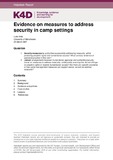| dc.contributor.author | Kelly, Luke | |
| dc.coverage.spatial | Kenya | en |
| dc.coverage.spatial | Uganda | en |
| dc.coverage.spatial | Tanzania | en |
| dc.coverage.spatial | Guinea | en |
| dc.date.accessioned | 2021-04-20T09:52:15Z | |
| dc.date.available | 2021-04-20T09:52:15Z | |
| dc.date.issued | 2021-03-23 | |
| dc.identifier.citation | Kelly, L. (2021). Evidence on measures to address security in camp settings. K4D Helpdesk Report 991. Brighton, UK: Institute of Development Studies. DOI: 10.19088/K4D.2021.052 | en |
| dc.identifier.uri | https://opendocs.ids.ac.uk/opendocs/handle/20.500.12413/16547 | |
| dc.description.abstract | This rapid literature review finds that authorities use a range of methods to reduce insecurity in camps. Security in camps can be addressed through better planning of services by camp management, by more involvement of refugees, and through the use of outside security support. However, the militarisation of camps is a broader problem that requires political support from a number of stakeholders. The review focuses on insecurity arising from conflict (militarisation) and from crime and disputes within and around camps. It starts from the position that camps for refugees or internally displaced persons (IDPs) should be ‘civilian and humanitarian in character’, and thus, they should not host active combatants or fighters or support conflict. The rights of camp residents - e.g. non-refoulment of refugees - should be respected. In the case of insecurity arising from crime and disputes within and around camps, security measures should be proportionate and consider refugee protection. This review surveys evaluations and academic papers on camp security management. There is a significant body of evidence on the problem of camp militarisation in settings including Zaire/DRC, Thailand, Lebanon and the former Yugoslavia. However, the review has found relatively little evidence on successful efforts to counter militarisation in cases of conflict. It has found case studies and evaluations of a number of programmes to improve lower-level camp security, or in cases where conflict has abated. There are several reviews of UNHCR ’security packages’ involving support to host state police in African countries. These lessons are focused on how to engage with refugee and host populations, as well as host states, and how to manage security services. Guidance on camp management is also surveyed. There is very little evidence discussing liaison arrangements beyond stating the need to provide protection training and oversight for security forces; and the need for principled engagement with states and non-state conflict parties. | en |
| dc.description.sponsorship | FCDO (Foreign, Commonwealth and Development Office) | en |
| dc.language.iso | en | en |
| dc.publisher | Institute of Development Studies | en |
| dc.relation.ispartofseries | K4D Helpdesk Report;991 | |
| dc.rights.uri | https://www.nationalarchives.gov.uk/doc/open-government-licence/version/3/ | en |
| dc.subject | Aid | en |
| dc.subject | Rights | en |
| dc.subject | Security and Conflict | en |
| dc.title | Evidence on Measures to Address Security in Camp Settings | en |
| dc.type | Helpdesk | en |
| dc.rights.holder | © Crown copyright 2021 | en |
| dc.identifier.doi | 10.19088/K4D.2021.052 | |
| dcterms.dateAccepted | 2021-03-23 | |
| rioxxterms.funder | Default funder | en |
| rioxxterms.identifier.project | Default project | en |
| rioxxterms.version | VoR | en |
| rioxxterms.versionofrecord | 10.19088/K4D.2021.052 | en |
| rioxxterms.funder.project | 9ce4e4dc-26e9-4d78-96e9-15e4dcac0642 | en |

